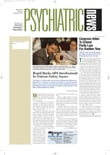In the past decade several studies have implied that various factors associated with fetal development and birth may increase a child’s risk of eventually developing schizophrenia. Many of those studies have implicated various events that have an impact on the developing fetus, either directly or indirectly. Now, a new study again suggests that babies with Rh positive blood, born to mothers who have Rh negative blood—a condition known as maternal-fetal Rh incompatibility—are at increased relative risk for developing schizophrenia.
This particular line of research has a very pointed implication: Differences between a child’s and mother’s blood type create a risk factor that is potentially preventable.
“Rh incompatibility is something that people can get a handle on,” said Christina G.S. Palmer, M.D., an assistant professor of psychiatry and biobehavioral sciences at the University of California at Los Angeles, the study’s first author. “We have reliably effective pharmacological means to block [an Rh factor incompatibility].”
The hypothesis, Palmer told Psychiatric News, holds that the incompatibility between the Rh factor (coded for by the RHD gene) is “simply the set up. It is the sequelae of it that leads to the individual’s developing schizophrenia.”
Palmer emphasized that her study, which appears in the December issue of the American Journal of Human Genetics, does not implicate a direct causal relationship between a specific allele of the RHD gene and schizophrenia. “The RHD gene,” she said, “does not cause schizophrenia. What we have is a model for the pathogenesis of schizophrenia—a trigger that sets up a cascade of events that results in an increased risk of developing the disease.”
According to the model, which builds on work done in the mid- and late 1990s, there is a growing body of evidence indicating that environmental risk factors for schizophrenia include processes that involve the prenatal developmental environment.
Three prior studies have implicated Rh incompatibility as a potential risk factor for schizophrenia. When a mother is Rh negative, and thus has no protein in her own blood coded for by the RHD gene, and the fetus she is carrying is Rh positive, and thus has the RHD gene protein in its blood, the mother’s immune system may mount a response to the RHD protein, which it perceives as foreign. That maternal immune response can have drastic implications, including an all-out attack on the fetal blood cells carrying the RHD protein. That maternal immune response can cause fetal hypoxia and anemia. Rh incompatibility can also lead to an increase in unconjugated bilirubin, a known neurotoxin to which developing glial cells are sensitive. Both fetal hypoxia and abnormal glial development have both been tied to increased risk of developing schizophrenia in previous research.
In the current study, Palmer and her colleagues studied the RHD genotypes of 181 individuals with schizophrenia or schizoaffective disorder and their parents. In looking at the possible gene pair combinations for a child and both parents, Palmer detailed 15 possible combinations. Each subject and their parents were categorized into one of those 15 possible combinations.
What Palmer and her team expected to find—if their hypothesis was correct—was an overrepresentation within their sample of combinations in which the mother was Rh negative and the child was Rh positive.
“And that is exactly what we saw in our sample,” Palmer told Psychiatric News. “The relative risk was about twofold—not a huge increase in risk, but it’s not nothing either.”
All of the subjects in Palmer’s study were born prior to the advent of pharmacological means to block an Rh negative mother’s immune response to her Rh positive fetus—the first such product, RhoGAM (RhO [D] immune globulin) was developed in the late 1960s, as were the subjects tested in other studies implicating an RHD connection to schizophrenia.
Palmer said the most fascinating thing about the studies is the array of addressable questions that arise from the results.
“The big question in my mind is, Has the use of prophylaxis [against the mother’s immune response] reduced the risk of schizophrenia in Rh incompatibility or not? We don’t know,” she said, “but somebody should be following that up. It’s a big question. This is a risk that is due to an adverse fetal environment, not a gene that is acting directly on the individual fetus’s body to cause schizophrenia. And it should be a risk that is reducible.”
An abstract of “RHD Maternal-Fetal Genotype Incompatibility Increases Schizophrenia Susceptibility,” is posted on the Web at www.journals.uchicago.edu/AJHG/journal. ▪
